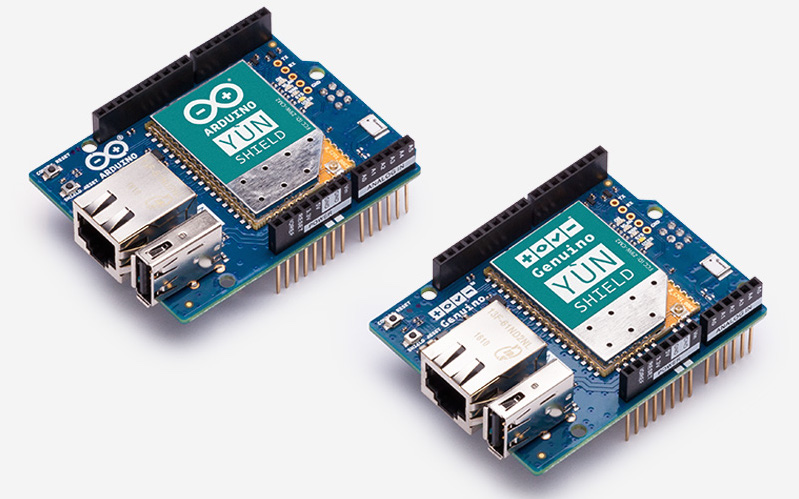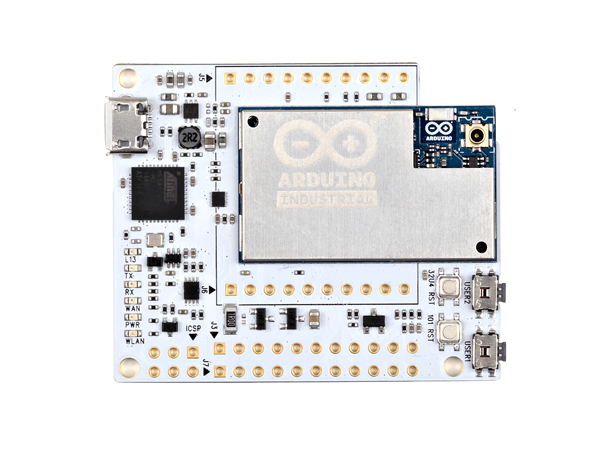Few would claim that the year-old fork and legal dispute between rival Arduino camps is healthy for the open source hardware community. Yet, so far, the platform remains strong, despite growing competition from open source Linux SBCs like the Raspberry Pi. In large part, this is due to the rising interest in Internet of Things (IoT) devices, which dovetails nicely with the low-power, gadget-oriented MCU-based platform.
In recent weeks, both Arduino camps have launched several innovative Arduino boards, all of them featuring onboard WiFi. Several of these run Linux while also enabling full Arduino compatibility. So far, the majority of Arduino users appears to have followed Arduino LLC, operating at Arduino.cc. However, because of a legal ruling, Arduino LLC must sell all Arduino boards outside the United States under the Genuino label, giving rival Arduino Srl a global advantage.

One of the central questions about the future of Arduino is to what extent this MCU-based platform should embrace Linux, which has spread quickly in Arduino-like, open-spec hacker boards like the Raspberry Pi. Before the split back in 2013, the project had experimented with a hybrid Linux/Arduino Arduino Yún, which runs the lightweight OpenWrt Linux on a MIPS-based Qualcomm Atheros AR9331 WiFi SoC. The thinking was that to be fully connected with the Internet via WiFi, you really need embedded Linux on board.
The Yún, which continues to be sold by both Arduino entities, never approached the sales of mainstream Arduinos like the Uno or Leonardo, and the promised, Linux-ready Arduino TRE never reached market. This apparent false start for Linux/Arduino hybrids was not surprising since developers who wanted Linux with Arduino could increasingly get both from an increasing number of more powerful, Linux-based hacker boards that add Arduino shield and/or Arduino IDE compatibility.
In recent months, however, Linux/Arduino hybrids sold under the Arduino label have made a comeback. Here’s a look at the latest announcements:
Arduino LLC: A Tiny Zero Follow-On and a Yún Shield
In April, Arduino LLC announced a WiFi-ready update to the Arduino Zero that offers WiFi without the Linux. The Arduino MKR1000 (Genuino MKR1000 outside the US) keeps the same $35 price as the Uno, but with a smaller, 2.2 by 1.0-inch footprint, a new cryptographic chip, and LiPo charging. The IoT-focused MKR1000 enables WiFi via an Atmel ATSAMW25H18 module.
The MKR1000 is backed up by a new Arduino IoT community website within Arduino.cc, as well as the announcement of a beta-level Arduino Create development environment that incorporates a web-based code editor. There’s also an alpha-stage Arduino Cloud platform that uses MQTT to aggregate data from WiFi- and crypto-enabled devices like the MKR1000.
This month, Arduino LLC unveiled a Linux-driven, WiFi-equipped Arduino Yún Shield. Like the Yún, the $50 shield runs OpenWrt on an Atheros AR9331 WiFi SoC, in this case via a surface-mounted 8devices Carambola 2 module. The Yún Shield, which is further equipped with an Ethernet port and a USB port, lets you upload Arduino sketches to any shield-ready Arduino board.
Arduino Srl: WiFi, With and Without the Linux
Like Arduino LLC, Arduino Srl has made a big push for onboard WiFi using both Linux and MCU-driven solutions. Last year, the company launched the Arduino Yún Mini, which like the Yún, runs the OpenWrt-based Linino on an AR9331 SoC. It followed up more recently with the more powerful, $99 Arduino Tian, which runs Linino on a MIPS-based 560MHz Qualcomm AR9432 WiFi SoC. The Tian also offers Bluetooth EDR/BLE 4.0, as well as a SAMD21 32-bit Cortex M0+ MCU.

Arduino Srl also announced two other WiFi-ready boards that do not run Linux. The Arduino Uno WiFi is a straight-up Uno clone that adds Espressif’s ESP8266 WiFi Module, based on a Tensilica Xtensa LX3 chip. The Arduino-compatible ESP8266, has attracted a thriving open source community.
This week, Arduino Srl will unveil a wireless-studded Arduino Primo. Nordic Semiconductor has already tipped the board as a design win for its nRF52 wireless SoC.
With the help of the nRF52, the Primo not only provides WiFi, but also Bluetooth Low Energy, NFC, and IR technologies. With Linux nowhere in sight, the nRF52 can achieve some pretty savvy, Linux-like wireless functionality, claims Nordic. For example, it can act as a TCP/IP Internet client and server over WiFi, and it enables NFC secure authentication and touch-to-pair. More experienced developers can develop IPv6-based Bluetooth LE applications.
LEDE Forks OpenWrt
Although neither Arduino camp has come up with a clear strategy regarding Linux, they’re keeping it in the mix. Meanwhile, a recent fork of the lightweight OpenWrt distribution, the only Linux that can effectively run on Arduinos, is adding to the uncertainty.
The router-focused OpenWrt project, which had previously inspired the peaceful spinoff of the Linino project, is now in the midst of a civil war. Earlier this month, several core developers announced a new Linux Embedded Development Environment (LEDE) project, which is billed as both a “reboot” and “spinoff” of OpenWrt.
As with the LibreELEC fork of the Kodi-based OpenELEC media player project, the split appears to be primarily about governance rather than technology. LEDE is mostly be concerned about improving transparency, inclusiveness, and timeliness. Yet, it’s possible a more substantial technological fork could emerge, as well.


